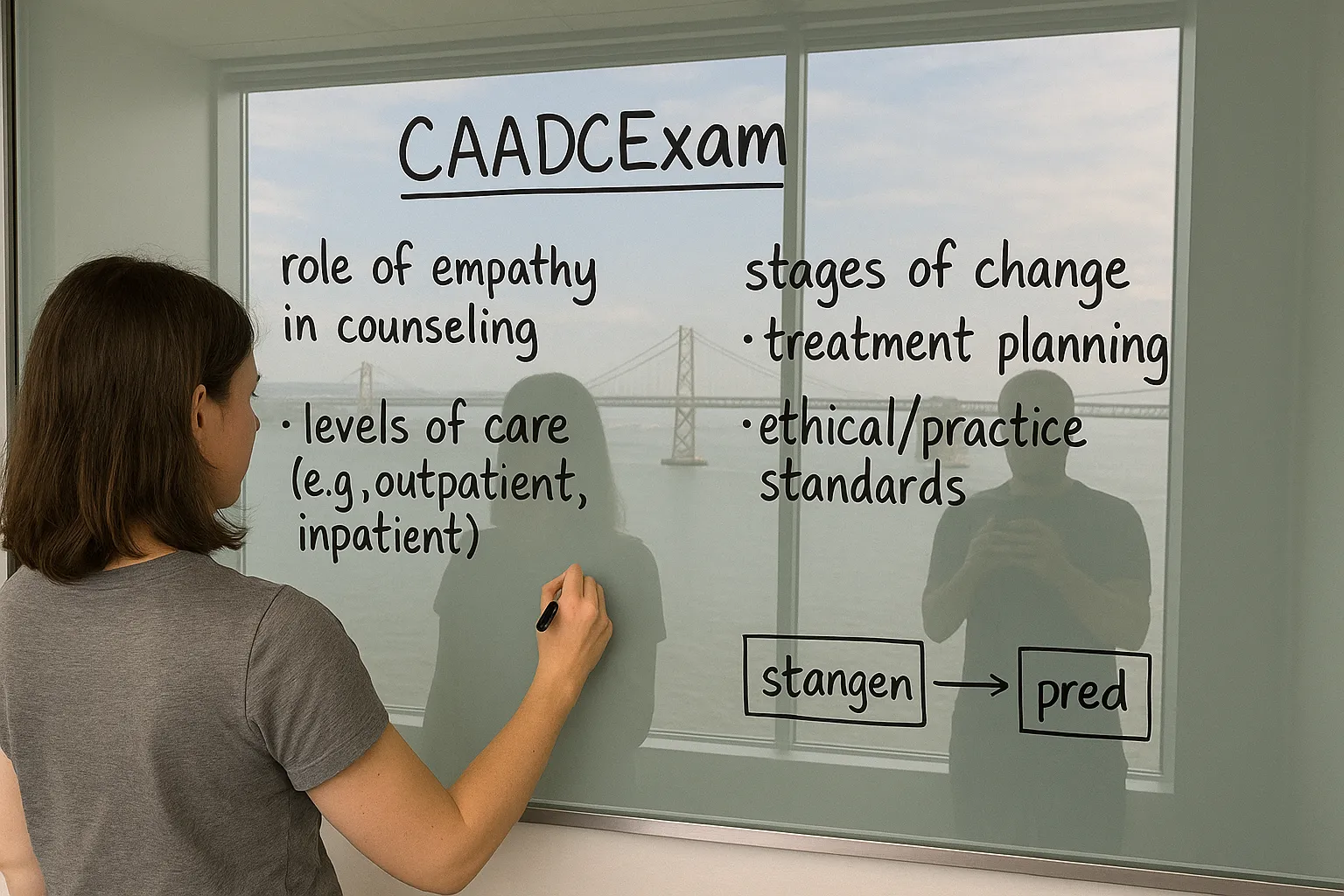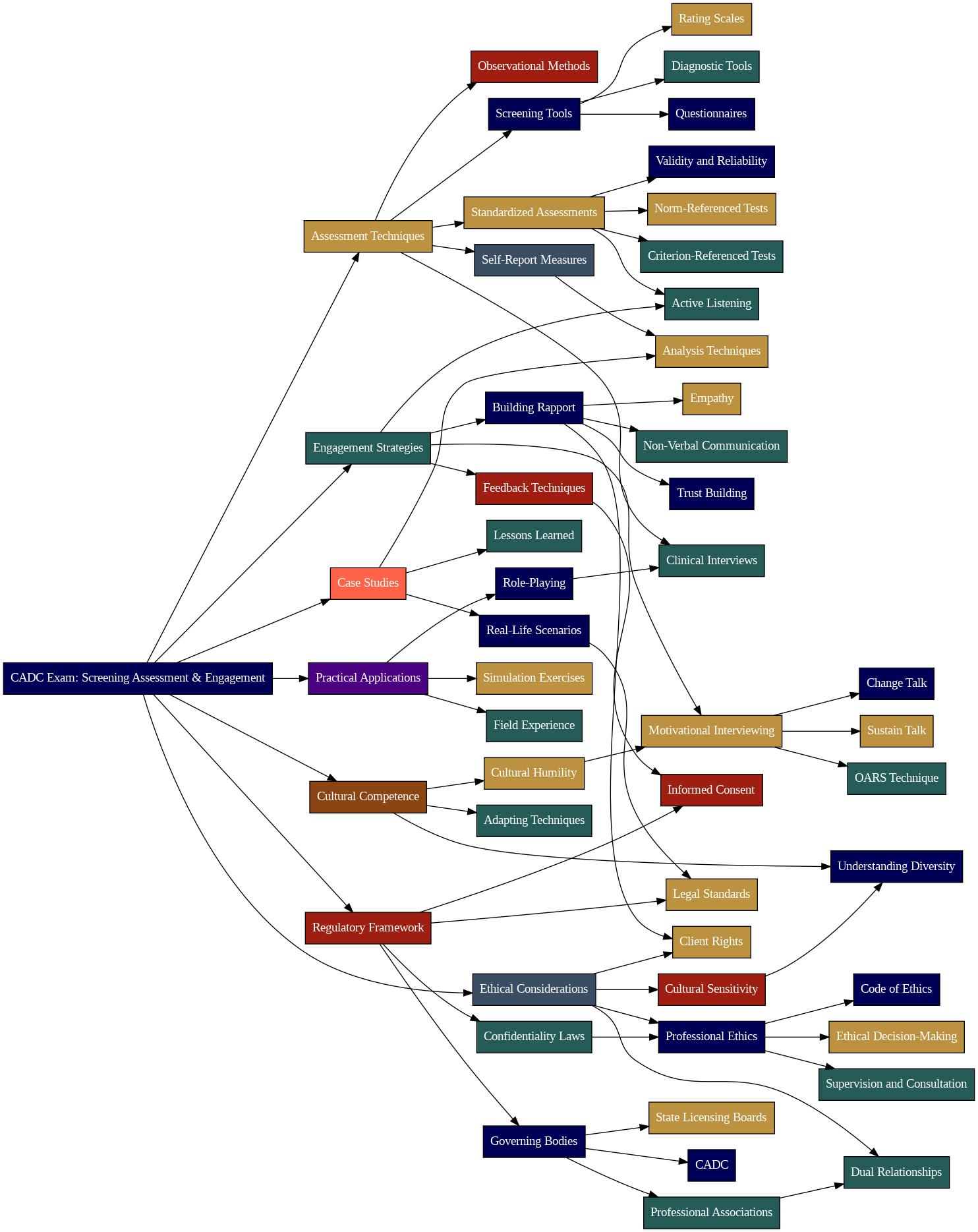Quiz-summary
0 of 29 questions completed
Questions:
- 1
- 2
- 3
- 4
- 5
- 6
- 7
- 8
- 9
- 10
- 11
- 12
- 13
- 14
- 15
- 16
- 17
- 18
- 19
- 20
- 21
- 22
- 23
- 24
- 25
- 26
- 27
- 28
- 29
Information
Premium Practice Questions
You have already completed the quiz before. Hence you can not start it again.
Quiz is loading...
You must sign in or sign up to start the quiz.
You have to finish following quiz, to start this quiz:
Results
0 of 29 questions answered correctly
Your time:
Time has elapsed
Categories
- Not categorized 0%
- 1
- 2
- 3
- 4
- 5
- 6
- 7
- 8
- 9
- 10
- 11
- 12
- 13
- 14
- 15
- 16
- 17
- 18
- 19
- 20
- 21
- 22
- 23
- 24
- 25
- 26
- 27
- 28
- 29
- Answered
- Review
-
Question 1 of 29
1. Question
An Iowa LADC, Javier, is working with an adult client, Maria, who is in recovery from opioid use disorder. During a session, Maria discloses that her neighbor’s 7-year-old child frequently comes to her house unsupervised and often appears with unexplained bruises. Maria states she suspects the child is being abused by the parents but doesn’t want to get involved. Considering Iowa law and ethical guidelines, what is Javier’s *most* appropriate course of action?
Correct
According to Iowa Administrative Code 641—155.37(225C,147,154D), a licensed substance abuse counselor (LADC) in Iowa has a legal obligation to report suspected child abuse. This duty to report supersedes confidentiality concerns. The counselor’s primary responsibility is to protect the welfare of the child. This means that even if the information was disclosed during a confidential counseling session, the LADC is still mandated to report the suspicion to the appropriate authorities, such as the Iowa Department of Human Services. Failing to report suspected child abuse can result in legal penalties for the LADC. The counselor should document the basis for their suspicion and the steps taken to report it. The duty to report is triggered when the LADC has a reasonable belief that a child has suffered abuse or neglect. The “reasonable belief” standard is lower than absolute certainty, meaning the counselor doesn’t need definitive proof to make a report. It is important to note that the report should be made promptly to ensure the child’s safety.
Incorrect
According to Iowa Administrative Code 641—155.37(225C,147,154D), a licensed substance abuse counselor (LADC) in Iowa has a legal obligation to report suspected child abuse. This duty to report supersedes confidentiality concerns. The counselor’s primary responsibility is to protect the welfare of the child. This means that even if the information was disclosed during a confidential counseling session, the LADC is still mandated to report the suspicion to the appropriate authorities, such as the Iowa Department of Human Services. Failing to report suspected child abuse can result in legal penalties for the LADC. The counselor should document the basis for their suspicion and the steps taken to report it. The duty to report is triggered when the LADC has a reasonable belief that a child has suffered abuse or neglect. The “reasonable belief” standard is lower than absolute certainty, meaning the counselor doesn’t need definitive proof to make a report. It is important to note that the report should be made promptly to ensure the child’s safety.
-
Question 2 of 29
2. Question
Where would an LADC in Iowa MOST likely find the specific laws and regulations governing their professional practice?
Correct
Iowa’s laws and regulations pertaining to substance abuse counseling are primarily found in the Iowa Code and the administrative rules of the Iowa Board of Behavioral Science. These regulations cover licensure requirements, scope of practice, ethical standards, and continuing education requirements for LADC’s. It’s crucial for LADC’s to stay informed about these laws and regulations to ensure they are practicing ethically and legally. Failure to comply with these regulations can result in disciplinary action, including suspension or revocation of licensure. LADC’s should regularly review the Iowa Code and the administrative rules of the Iowa Board of Behavioral Science to stay up-to-date on any changes or updates.
Incorrect
Iowa’s laws and regulations pertaining to substance abuse counseling are primarily found in the Iowa Code and the administrative rules of the Iowa Board of Behavioral Science. These regulations cover licensure requirements, scope of practice, ethical standards, and continuing education requirements for LADC’s. It’s crucial for LADC’s to stay informed about these laws and regulations to ensure they are practicing ethically and legally. Failure to comply with these regulations can result in disciplinary action, including suspension or revocation of licensure. LADC’s should regularly review the Iowa Code and the administrative rules of the Iowa Board of Behavioral Science to stay up-to-date on any changes or updates.
-
Question 3 of 29
3. Question
An LADC in Iowa, Michael, is working with a client, Lisa, who has successfully completed substance use treatment but continues to struggle with significant anxiety and depression unrelated to her substance use history. What is Michael’s MOST ethically sound course of action regarding Lisa’s ongoing mental health needs?
Correct
In Iowa, the LADC scope of practice is defined by the Iowa Board of Behavioral Science. This scope includes assessing, diagnosing, and treating substance use disorders, as well as providing individual, group, and family counseling. LADCs are expected to adhere to ethical standards, maintain confidentiality, and practice within their area of competence. They are also required to engage in continuing education to stay current with best practices in the field. While LADCs can provide mental health counseling related to substance use disorders, they are not typically licensed to provide comprehensive mental health treatment unless they hold additional credentials, such as a Licensed Mental Health Counselor (LMHC) license. Understanding the specific boundaries of the LADC scope of practice is crucial for ethical and legal compliance in Iowa.
Incorrect
In Iowa, the LADC scope of practice is defined by the Iowa Board of Behavioral Science. This scope includes assessing, diagnosing, and treating substance use disorders, as well as providing individual, group, and family counseling. LADCs are expected to adhere to ethical standards, maintain confidentiality, and practice within their area of competence. They are also required to engage in continuing education to stay current with best practices in the field. While LADCs can provide mental health counseling related to substance use disorders, they are not typically licensed to provide comprehensive mental health treatment unless they hold additional credentials, such as a Licensed Mental Health Counselor (LMHC) license. Understanding the specific boundaries of the LADC scope of practice is crucial for ethical and legal compliance in Iowa.
-
Question 4 of 29
4. Question
Jamal, an LADC in Iowa, is working with a client, DeShawn, who is struggling with opioid addiction. During a session, DeShawn expresses intense anger towards his former business partner, stating, “I’m going to make him pay for ruining my life. He won’t see it coming.” DeShawn has a history of impulsive behavior and owns several firearms. According to Iowa regulations and ethical guidelines, what is Jamal’s MOST appropriate course of action?
Correct
Iowa’s regulations regarding confidentiality for LADC professionals, as guided by both state and federal laws, mandate specific actions when facing a client’s potential harm to themselves or others. The duty to warn and protect, a critical exception to confidentiality, arises when a client poses an imminent threat. This necessitates a careful assessment of the threat’s credibility and immediacy. Iowa law aligns with the Tarasoff ruling’s principles, requiring reasonable steps to protect the intended victim. In this scenario, the counselor must prioritize the safety of both the client and the potential victim. The first step involves a thorough evaluation of the client’s statement. Is the threat specific and imminent? Does the client have the means to carry out the threat? If the assessment confirms a credible threat, the counselor is legally and ethically obligated to take action. This action typically involves notifying the intended victim and, if necessary, law enforcement. The counselor should also document the assessment, the decision-making process, and the actions taken. Consultation with a supervisor or legal counsel is advisable to ensure adherence to all applicable laws and ethical guidelines. It’s crucial to understand that breaching confidentiality in such situations is not a violation but a fulfillment of the duty to protect, balancing client privacy with public safety, and that in the state of Iowa, this is a mandatory action when a credible threat exists. The counselor’s actions must be guided by the principle of least intrusion, disclosing only the information necessary to prevent harm.
Incorrect
Iowa’s regulations regarding confidentiality for LADC professionals, as guided by both state and federal laws, mandate specific actions when facing a client’s potential harm to themselves or others. The duty to warn and protect, a critical exception to confidentiality, arises when a client poses an imminent threat. This necessitates a careful assessment of the threat’s credibility and immediacy. Iowa law aligns with the Tarasoff ruling’s principles, requiring reasonable steps to protect the intended victim. In this scenario, the counselor must prioritize the safety of both the client and the potential victim. The first step involves a thorough evaluation of the client’s statement. Is the threat specific and imminent? Does the client have the means to carry out the threat? If the assessment confirms a credible threat, the counselor is legally and ethically obligated to take action. This action typically involves notifying the intended victim and, if necessary, law enforcement. The counselor should also document the assessment, the decision-making process, and the actions taken. Consultation with a supervisor or legal counsel is advisable to ensure adherence to all applicable laws and ethical guidelines. It’s crucial to understand that breaching confidentiality in such situations is not a violation but a fulfillment of the duty to protect, balancing client privacy with public safety, and that in the state of Iowa, this is a mandatory action when a credible threat exists. The counselor’s actions must be guided by the principle of least intrusion, disclosing only the information necessary to prevent harm.
-
Question 5 of 29
5. Question
An Iowa Licensed Alcohol and Drug Counselor (LADC), while providing counseling services to a 68-year-old client named Maria, observes that Maria has unexplained bruises and seems unusually withdrawn. Maria mentions that her son, with whom she lives and who has a history of alcohol abuse, has been increasingly irritable lately. Based on Iowa Administrative Code 641—155.34(225C) regarding dependent adult abuse, what is the LADC’s most appropriate course of action?
Correct
According to Iowa Administrative Code 641—155.34(225C), LADC’s are mandated reporters regarding suspected dependent adult abuse. This responsibility arises when the LADC, in their professional capacity, reasonably believes a dependent adult has suffered abuse. The “reasonable belief” threshold is key; it doesn’t require absolute certainty, but more than mere suspicion. The LADC must act in good faith, meaning their report is based on genuine concern and not malicious intent. The report must be made to the Iowa Department of Human Services (DHS). Failure to report suspected abuse can result in legal consequences for the LADC, including potential disciplinary action by the licensing board. The Iowa law intends to protect vulnerable adults from harm by ensuring professionals who interact with them regularly are vigilant and report suspected abuse. The dependent adult definition includes individuals 18 years or older with a physical or mental condition that impairs their ability to care for themselves. It’s crucial for LADCs in Iowa to understand their reporting obligations to safeguard dependent adults’ well-being and adhere to legal and ethical standards. Understanding the specific definition of “dependent adult” under Iowa law is critical for proper application of the mandatory reporting requirement.
Incorrect
According to Iowa Administrative Code 641—155.34(225C), LADC’s are mandated reporters regarding suspected dependent adult abuse. This responsibility arises when the LADC, in their professional capacity, reasonably believes a dependent adult has suffered abuse. The “reasonable belief” threshold is key; it doesn’t require absolute certainty, but more than mere suspicion. The LADC must act in good faith, meaning their report is based on genuine concern and not malicious intent. The report must be made to the Iowa Department of Human Services (DHS). Failure to report suspected abuse can result in legal consequences for the LADC, including potential disciplinary action by the licensing board. The Iowa law intends to protect vulnerable adults from harm by ensuring professionals who interact with them regularly are vigilant and report suspected abuse. The dependent adult definition includes individuals 18 years or older with a physical or mental condition that impairs their ability to care for themselves. It’s crucial for LADCs in Iowa to understand their reporting obligations to safeguard dependent adults’ well-being and adhere to legal and ethical standards. Understanding the specific definition of “dependent adult” under Iowa law is critical for proper application of the mandatory reporting requirement.
-
Question 6 of 29
6. Question
A client in Iowa requests to review their complete treatment record, including session notes, assessment reports, and correspondence. Under HIPAA regulations, what is the counselor’s obligation?
Correct
The Health Insurance Portability and Accountability Act (HIPAA) Privacy Rule protects the privacy of individually identifiable health information, known as protected health information (PHI). PHI includes any information that relates to a person’s past, present, or future physical or mental health or condition; the provision of health care to the individual; or the past, present, or future payment for the provision of health care to the individual; and that identifies the individual or for which there is a reasonable basis to believe it can be used to identify the individual. Covered entities, such as healthcare providers and health plans, must comply with HIPAA regulations. Clients have the right to access their PHI, request amendments to their PHI, and receive an accounting of disclosures of their PHI. Counselors must obtain written authorization from clients before disclosing PHI, except in limited circumstances (e.g., for treatment, payment, or healthcare operations, or when required by law). HIPAA also addresses security standards for protecting electronic PHI. Violations of HIPAA can result in civil and criminal penalties.
Incorrect
The Health Insurance Portability and Accountability Act (HIPAA) Privacy Rule protects the privacy of individually identifiable health information, known as protected health information (PHI). PHI includes any information that relates to a person’s past, present, or future physical or mental health or condition; the provision of health care to the individual; or the past, present, or future payment for the provision of health care to the individual; and that identifies the individual or for which there is a reasonable basis to believe it can be used to identify the individual. Covered entities, such as healthcare providers and health plans, must comply with HIPAA regulations. Clients have the right to access their PHI, request amendments to their PHI, and receive an accounting of disclosures of their PHI. Counselors must obtain written authorization from clients before disclosing PHI, except in limited circumstances (e.g., for treatment, payment, or healthcare operations, or when required by law). HIPAA also addresses security standards for protecting electronic PHI. Violations of HIPAA can result in civil and criminal penalties.
-
Question 7 of 29
7. Question
A client, Javier, in an Iowa substance use treatment program, discloses to his LADC that he is planning to physically harm his estranged wife, providing specific details about when and how he intends to carry out the act. Javier has a history of violent behavior and access to firearms. According to Iowa law and ethical guidelines for LADCs, what is the MOST appropriate course of action for the counselor?
Correct
Iowa LADC professionals must navigate complex ethical situations, especially concerning client confidentiality and duty to warn. The Iowa Administrative Code, specifically related to licensed substance abuse treatment professionals, mandates a balancing act between protecting client privacy and ensuring the safety of potential victims. This often involves a careful assessment of the immediacy and severity of the threat, the credibility of the information, and the client’s access to means of harm. Failing to appropriately assess and act on a credible threat can lead to legal repercussions and ethical violations. The LADC must consult with supervisors and legal counsel when uncertain about the appropriate course of action. Furthermore, documentation of the decision-making process, including the rationale for either maintaining confidentiality or breaching it to warn potential victims, is crucial for demonstrating ethical and legal compliance. In situations where a client expresses intent to harm another person, the LADC is required to consider the Tarasoff ruling and its implications for Iowa law. This requires a careful evaluation of the threat, the identifiability of the victim, and the counselor’s ability to prevent harm. This responsibility extends to cases involving domestic violence and child abuse, where specific reporting obligations may supersede confidentiality.
Incorrect
Iowa LADC professionals must navigate complex ethical situations, especially concerning client confidentiality and duty to warn. The Iowa Administrative Code, specifically related to licensed substance abuse treatment professionals, mandates a balancing act between protecting client privacy and ensuring the safety of potential victims. This often involves a careful assessment of the immediacy and severity of the threat, the credibility of the information, and the client’s access to means of harm. Failing to appropriately assess and act on a credible threat can lead to legal repercussions and ethical violations. The LADC must consult with supervisors and legal counsel when uncertain about the appropriate course of action. Furthermore, documentation of the decision-making process, including the rationale for either maintaining confidentiality or breaching it to warn potential victims, is crucial for demonstrating ethical and legal compliance. In situations where a client expresses intent to harm another person, the LADC is required to consider the Tarasoff ruling and its implications for Iowa law. This requires a careful evaluation of the threat, the identifiability of the victim, and the counselor’s ability to prevent harm. This responsibility extends to cases involving domestic violence and child abuse, where specific reporting obligations may supersede confidentiality.
-
Question 8 of 29
8. Question
A newly licensed LADC in Iowa, Javier, is working with a client, Maria, who has a long history of opioid use disorder and co-occurring depression. Maria has expressed ambivalence about starting medication-assisted treatment (MAT) despite Javier’s explanation of its potential benefits. Javier, feeling pressured by his supervisor to increase MAT enrollment rates at the clinic, subtly downplays the potential side effects of naltrexone and emphasizes its success stories, while omitting information about alternative treatment options like intensive outpatient therapy. Furthermore, Javier, who is struggling financially, mentions to Maria that he also works as a rideshare driver and encourages her to use his services for transportation to her appointments. Considering the ethical and legal guidelines for LADCs in Iowa, which of the following actions represents the MOST significant ethical violation in this scenario?
Correct
Iowa LADC’s ethical guidelines and legal statutes emphasize the importance of client autonomy and informed consent. This includes a thorough understanding of the treatment process, potential risks and benefits, alternatives, and the right to refuse or withdraw from treatment at any time. Competence is demonstrated through ongoing education and training, especially in specialized areas like trauma-informed care or medication-assisted treatment (MAT). Dual relationships, such as becoming friends with a client or engaging in business ventures, are strictly prohibited due to the inherent power imbalance and potential for exploitation. Iowa law mandates reporting suspected child abuse or neglect, even if it breaches client confidentiality. Ethical decision-making models, such as the Corey, Corey, and Callanan model, provide a structured approach to resolving ethical dilemmas by considering all relevant factors, consulting with supervisors or colleagues, and documenting the decision-making process. Cultural competence requires ongoing self-reflection and education to understand and respect diverse cultural backgrounds and adapt counseling approaches accordingly. A key element is the ability to recognize how one’s own biases and assumptions may impact the therapeutic relationship.
Incorrect
Iowa LADC’s ethical guidelines and legal statutes emphasize the importance of client autonomy and informed consent. This includes a thorough understanding of the treatment process, potential risks and benefits, alternatives, and the right to refuse or withdraw from treatment at any time. Competence is demonstrated through ongoing education and training, especially in specialized areas like trauma-informed care or medication-assisted treatment (MAT). Dual relationships, such as becoming friends with a client or engaging in business ventures, are strictly prohibited due to the inherent power imbalance and potential for exploitation. Iowa law mandates reporting suspected child abuse or neglect, even if it breaches client confidentiality. Ethical decision-making models, such as the Corey, Corey, and Callanan model, provide a structured approach to resolving ethical dilemmas by considering all relevant factors, consulting with supervisors or colleagues, and documenting the decision-making process. Cultural competence requires ongoing self-reflection and education to understand and respect diverse cultural backgrounds and adapt counseling approaches accordingly. A key element is the ability to recognize how one’s own biases and assumptions may impact the therapeutic relationship.
-
Question 9 of 29
9. Question
An LADC in Iowa is feeling overwhelmed and emotionally drained due to the demanding nature of their work. Which of the following self-care strategies is MOST likely to be effective in preventing burnout?
Correct
Iowa LADCs are required to engage in ongoing professional development and supervision to maintain their competence and ethical practice. Continuing education helps counselors stay current with the latest research, best practices, and ethical guidelines. Supervision provides a forum for counselors to reflect on their work, receive feedback, and address any challenges they may be facing. Self-care is essential for preventing burnout and maintaining personal well-being. Professional identity and advocacy involve promoting the profession and advocating for the needs of clients. Ethical considerations in supervision include ensuring confidentiality, providing constructive feedback, and addressing any conflicts of interest. Reflective practice involves critically examining one’s own beliefs, values, and biases to improve practice.
Incorrect
Iowa LADCs are required to engage in ongoing professional development and supervision to maintain their competence and ethical practice. Continuing education helps counselors stay current with the latest research, best practices, and ethical guidelines. Supervision provides a forum for counselors to reflect on their work, receive feedback, and address any challenges they may be facing. Self-care is essential for preventing burnout and maintaining personal well-being. Professional identity and advocacy involve promoting the profession and advocating for the needs of clients. Ethical considerations in supervision include ensuring confidentiality, providing constructive feedback, and addressing any conflicts of interest. Reflective practice involves critically examining one’s own beliefs, values, and biases to improve practice.
-
Question 10 of 29
10. Question
In Iowa, LADC counselor, Fatima, is working with a client, Daniel, who has a history of methamphetamine use and violent behavior. During a session, Daniel expresses intense anger towards his estranged wife, explicitly stating, “I’m going to make her pay for what she’s done. She won’t see it coming.” Daniel has previously stalked his wife and has access to firearms. According to Iowa’s ethical guidelines and legal obligations regarding duty to warn and protect, what is Fatima’s MOST appropriate course of action?
Correct
Iowa’s regulations regarding substance abuse counselors emphasize the importance of protecting client confidentiality while also recognizing situations where that confidentiality must be breached to ensure safety. Duty to warn and protect is a critical exception. It requires counselors to take action when a client poses a serious threat of harm to a reasonably identifiable victim. This duty is not absolute and involves a careful assessment of the client’s behavior, the credibility of the threat, and the imminence of the danger. The counselor must document their assessment and the actions taken. Failing to act appropriately could result in legal liability and ethical violations. In this scenario, counselor is mandated to report to the concerned authorities so that the victim can be protected. The counselor’s actions should be guided by the principle of minimizing the breach of confidentiality while maximizing the safety of the potential victim. This includes notifying the intended victim, law enforcement, or other relevant parties, as dictated by Iowa law and ethical guidelines. This also encompasses the need to ensure that the client receives appropriate support and intervention to address the underlying issues contributing to the threat. Consultation with supervisors and legal counsel is advisable to ensure adherence to all applicable standards.
Incorrect
Iowa’s regulations regarding substance abuse counselors emphasize the importance of protecting client confidentiality while also recognizing situations where that confidentiality must be breached to ensure safety. Duty to warn and protect is a critical exception. It requires counselors to take action when a client poses a serious threat of harm to a reasonably identifiable victim. This duty is not absolute and involves a careful assessment of the client’s behavior, the credibility of the threat, and the imminence of the danger. The counselor must document their assessment and the actions taken. Failing to act appropriately could result in legal liability and ethical violations. In this scenario, counselor is mandated to report to the concerned authorities so that the victim can be protected. The counselor’s actions should be guided by the principle of minimizing the breach of confidentiality while maximizing the safety of the potential victim. This includes notifying the intended victim, law enforcement, or other relevant parties, as dictated by Iowa law and ethical guidelines. This also encompasses the need to ensure that the client receives appropriate support and intervention to address the underlying issues contributing to the threat. Consultation with supervisors and legal counsel is advisable to ensure adherence to all applicable standards.
-
Question 11 of 29
11. Question
An Iowa LADC is using the DSM-5 to assess a client for a potential Alcohol Use Disorder. The client reports experiencing cravings, unsuccessful attempts to cut down drinking, and continued alcohol use despite knowing it exacerbates their existing liver condition. Based on this information alone, what is the MINIMUM severity level of Alcohol Use Disorder this client would likely meet, according to DSM-5 criteria?
Correct
The DSM-5 (Diagnostic and Statistical Manual of Mental Disorders, 5th Edition) provides specific criteria for diagnosing Substance Use Disorders (SUDs). These criteria are organized into categories such as impaired control, social impairment, risky use, and pharmacological criteria (tolerance and withdrawal). The severity of the SUD is determined by the number of criteria met. Meeting 2-3 criteria indicates a mild SUD, 4-5 criteria indicates a moderate SUD, and 6 or more criteria indicates a severe SUD. It’s important to note that the DSM-5 emphasizes a dimensional approach to diagnosis, recognizing that SUDs exist on a spectrum of severity. The DSM-5 also includes specifiers to provide additional information about the SUD, such as whether the individual is in early remission, sustained remission, or on medication-assisted treatment. The DSM-5 criteria are used by clinicians to assess and diagnose SUDs, inform treatment planning, and track progress over time.
Incorrect
The DSM-5 (Diagnostic and Statistical Manual of Mental Disorders, 5th Edition) provides specific criteria for diagnosing Substance Use Disorders (SUDs). These criteria are organized into categories such as impaired control, social impairment, risky use, and pharmacological criteria (tolerance and withdrawal). The severity of the SUD is determined by the number of criteria met. Meeting 2-3 criteria indicates a mild SUD, 4-5 criteria indicates a moderate SUD, and 6 or more criteria indicates a severe SUD. It’s important to note that the DSM-5 emphasizes a dimensional approach to diagnosis, recognizing that SUDs exist on a spectrum of severity. The DSM-5 also includes specifiers to provide additional information about the SUD, such as whether the individual is in early remission, sustained remission, or on medication-assisted treatment. The DSM-5 criteria are used by clinicians to assess and diagnose SUDs, inform treatment planning, and track progress over time.
-
Question 12 of 29
12. Question
Sixteen-year-old Kai seeks substance abuse counseling in Iowa without parental consent, disclosing daily marijuana use and occasional use of prescription opioids obtained from a friend. Kai explicitly requests that the counselor, LADC Maria, not inform their parents, fearing repercussions and a loss of autonomy. Kai is actively participating in counseling and demonstrates a clear understanding of the risks associated with substance use. Under Iowa law and ethical guidelines for LADCs, what is Maria’s MOST appropriate course of action regarding confidentiality?
Correct
In Iowa, Licensed Alcohol and Drug Counselors (LADCs) face specific ethical obligations regarding client confidentiality, particularly concerning minors. While generally, client information is protected under confidentiality laws, exceptions exist, particularly when a minor client is involved in substance use treatment. Iowa Code section 125.37 addresses confidentiality in substance abuse treatment and aligns with federal regulations (42 CFR Part 2) regarding the confidentiality of alcohol and drug abuse patient records. However, Iowa law also acknowledges the rights and responsibilities of parents or guardians of minors. When a minor seeks substance abuse treatment without parental consent, the counselor must navigate a complex ethical landscape. Iowa law allows minors to consent to substance abuse treatment under certain circumstances, such as when the minor is mature enough to understand the risks and benefits of treatment. However, the counselor must also consider the potential benefits of involving the parents or guardians in the treatment process. The key ethical consideration is balancing the minor’s right to privacy and the potential need for parental involvement to ensure the minor’s well-being. The counselor must assess the minor’s maturity, the nature of the substance abuse problem, and the potential risks and benefits of involving the parents or guardians. If the counselor determines that involving the parents or guardians is in the minor’s best interest, the counselor must obtain the minor’s consent to disclose the information, if possible. If the minor refuses to consent, the counselor must carefully consider whether there is a legal or ethical obligation to disclose the information, such as if the minor is at risk of harm. The counselor should also document the decision-making process and the reasons for disclosing or not disclosing the information. Consultation with a supervisor or legal counsel is advisable in complex cases. The counselor’s primary duty is to act in the best interest of the minor client, while also respecting the minor’s autonomy and right to privacy to the greatest extent possible under Iowa law and ethical guidelines.
Incorrect
In Iowa, Licensed Alcohol and Drug Counselors (LADCs) face specific ethical obligations regarding client confidentiality, particularly concerning minors. While generally, client information is protected under confidentiality laws, exceptions exist, particularly when a minor client is involved in substance use treatment. Iowa Code section 125.37 addresses confidentiality in substance abuse treatment and aligns with federal regulations (42 CFR Part 2) regarding the confidentiality of alcohol and drug abuse patient records. However, Iowa law also acknowledges the rights and responsibilities of parents or guardians of minors. When a minor seeks substance abuse treatment without parental consent, the counselor must navigate a complex ethical landscape. Iowa law allows minors to consent to substance abuse treatment under certain circumstances, such as when the minor is mature enough to understand the risks and benefits of treatment. However, the counselor must also consider the potential benefits of involving the parents or guardians in the treatment process. The key ethical consideration is balancing the minor’s right to privacy and the potential need for parental involvement to ensure the minor’s well-being. The counselor must assess the minor’s maturity, the nature of the substance abuse problem, and the potential risks and benefits of involving the parents or guardians. If the counselor determines that involving the parents or guardians is in the minor’s best interest, the counselor must obtain the minor’s consent to disclose the information, if possible. If the minor refuses to consent, the counselor must carefully consider whether there is a legal or ethical obligation to disclose the information, such as if the minor is at risk of harm. The counselor should also document the decision-making process and the reasons for disclosing or not disclosing the information. Consultation with a supervisor or legal counsel is advisable in complex cases. The counselor’s primary duty is to act in the best interest of the minor client, while also respecting the minor’s autonomy and right to privacy to the greatest extent possible under Iowa law and ethical guidelines.
-
Question 13 of 29
13. Question
Jamal, an Iowa LADC, is treating a client, Deidre, for opioid use disorder. During a session, Deidre reveals a detailed plan to physically harm her estranged husband, providing specific details about when and how she intends to carry out the act. Jamal documents the threat in Deidre’s record but takes no further action, believing client confidentiality supersedes other concerns. Which of the following best describes Jamal’s ethical and legal obligations in this situation under Iowa law and ethical guidelines for LADC’s?
Correct
Iowa’s regulations concerning substance abuse treatment, particularly for LADC’s, emphasize the importance of safeguarding client confidentiality while simultaneously recognizing the necessity to protect individuals from potential harm. This is reflected in the intersection of Iowa Code Chapter 125 (dealing with substance abuse treatment) and relevant sections of the Iowa Administrative Code, which outline specific reporting obligations. The “duty to warn and protect” doctrine, as applied in Iowa, necessitates a careful balancing act. LADC’s must assess the credibility and imminence of threats made by clients. If a client expresses intent to harm a specific individual, and the counselor believes the threat is genuine and imminent, they have a legal and ethical obligation to take reasonable steps to prevent the harm. These steps can include notifying the intended victim, law enforcement, or both. Simply documenting the threat in the client’s record is insufficient. Consultation with a supervisor or legal counsel is strongly recommended to navigate the complexities of these situations and ensure compliance with both confidentiality requirements and the duty to protect. The counselor’s actions must be defensible and based on a reasonable assessment of the risk posed by the client. Failure to act appropriately could result in legal liability and ethical sanctions.
Incorrect
Iowa’s regulations concerning substance abuse treatment, particularly for LADC’s, emphasize the importance of safeguarding client confidentiality while simultaneously recognizing the necessity to protect individuals from potential harm. This is reflected in the intersection of Iowa Code Chapter 125 (dealing with substance abuse treatment) and relevant sections of the Iowa Administrative Code, which outline specific reporting obligations. The “duty to warn and protect” doctrine, as applied in Iowa, necessitates a careful balancing act. LADC’s must assess the credibility and imminence of threats made by clients. If a client expresses intent to harm a specific individual, and the counselor believes the threat is genuine and imminent, they have a legal and ethical obligation to take reasonable steps to prevent the harm. These steps can include notifying the intended victim, law enforcement, or both. Simply documenting the threat in the client’s record is insufficient. Consultation with a supervisor or legal counsel is strongly recommended to navigate the complexities of these situations and ensure compliance with both confidentiality requirements and the duty to protect. The counselor’s actions must be defensible and based on a reasonable assessment of the risk posed by the client. Failure to act appropriately could result in legal liability and ethical sanctions.
-
Question 14 of 29
14. Question
An Iowa LADC, assisting a client with opioid use disorder, learns that the client’s eight-year-old child frequently misses school and is often left unsupervised at home. The client admits to sometimes using opioids in the child’s presence, but insists the child is never harmed. The LADC suspects possible neglect. According to Iowa law, what is the LADC’s ethical and legal obligation?
Correct
In Iowa, Licensed Alcohol and Drug Counselors (LADCs) are mandated reporters under specific circumstances. Iowa law dictates that LADCs must report suspected child abuse or neglect, as defined by Iowa Code Chapter 232. The reporting obligation arises when the LADC, in their professional capacity, has reasonable cause to believe that a child has suffered abuse or neglect. This duty supersedes confidentiality concerns, reflecting the state’s commitment to child welfare. Failing to report suspected child abuse or neglect can result in legal penalties for the LADC. It’s crucial to understand that “reasonable cause” does not require absolute certainty but a credible basis for suspicion. Furthermore, Iowa law provides immunity from liability for good-faith reporting, encouraging professionals to prioritize child safety. While LADCs also have ethical obligations to protect client confidentiality, the duty to report suspected child abuse takes precedence. Understanding the nuances of Iowa’s reporting laws is vital for ethical and legal compliance. The LADC must be aware of what constitutes abuse and neglect under Iowa law, as well as the proper procedures for reporting. This involves contacting the Iowa Department of Human Services or law enforcement. The LADC must document the basis for their suspicion and the steps taken to report it.
Incorrect
In Iowa, Licensed Alcohol and Drug Counselors (LADCs) are mandated reporters under specific circumstances. Iowa law dictates that LADCs must report suspected child abuse or neglect, as defined by Iowa Code Chapter 232. The reporting obligation arises when the LADC, in their professional capacity, has reasonable cause to believe that a child has suffered abuse or neglect. This duty supersedes confidentiality concerns, reflecting the state’s commitment to child welfare. Failing to report suspected child abuse or neglect can result in legal penalties for the LADC. It’s crucial to understand that “reasonable cause” does not require absolute certainty but a credible basis for suspicion. Furthermore, Iowa law provides immunity from liability for good-faith reporting, encouraging professionals to prioritize child safety. While LADCs also have ethical obligations to protect client confidentiality, the duty to report suspected child abuse takes precedence. Understanding the nuances of Iowa’s reporting laws is vital for ethical and legal compliance. The LADC must be aware of what constitutes abuse and neglect under Iowa law, as well as the proper procedures for reporting. This involves contacting the Iowa Department of Human Services or law enforcement. The LADC must document the basis for their suspicion and the steps taken to report it.
-
Question 15 of 29
15. Question
A Licensed Alcohol and Drug Counselor (LADC) in Iowa is treating a client with a severe opioid use disorder who also discloses experiencing intimate partner violence. The client is hesitant to report the abuse due to fear of retaliation from their partner. The LADC feels conflicted between respecting the client’s autonomy and the duty to protect the client from harm. According to Iowa’s ethical guidelines for LADCs, what is the MOST appropriate initial step the counselor should take?
Correct
In Iowa, LADC professionals navigating ethical dilemmas must adhere to a structured decision-making process that prioritizes client well-being and legal compliance. A crucial aspect of this process involves consulting with supervisors and peers to gain diverse perspectives and ensure objectivity. Failing to consult can lead to biased decisions that may harm the client or expose the counselor to legal repercussions. Iowa’s regulations emphasize the importance of documenting all consultations and the rationale behind the chosen course of action. Additionally, counselors must thoroughly assess the potential impact of their decisions on all parties involved, including the client, their family, and the community. This assessment should consider cultural factors, individual vulnerabilities, and potential risks. The ultimate goal is to select the option that maximizes benefits and minimizes harm, while remaining within the boundaries of ethical practice and legal requirements. If the counselor feels that they are unable to make an unbiased decision they should refer the client to another professional. The LADC should also refer the client to another professional if the client would be better served by another professional.
Incorrect
In Iowa, LADC professionals navigating ethical dilemmas must adhere to a structured decision-making process that prioritizes client well-being and legal compliance. A crucial aspect of this process involves consulting with supervisors and peers to gain diverse perspectives and ensure objectivity. Failing to consult can lead to biased decisions that may harm the client or expose the counselor to legal repercussions. Iowa’s regulations emphasize the importance of documenting all consultations and the rationale behind the chosen course of action. Additionally, counselors must thoroughly assess the potential impact of their decisions on all parties involved, including the client, their family, and the community. This assessment should consider cultural factors, individual vulnerabilities, and potential risks. The ultimate goal is to select the option that maximizes benefits and minimizes harm, while remaining within the boundaries of ethical practice and legal requirements. If the counselor feels that they are unable to make an unbiased decision they should refer the client to another professional. The LADC should also refer the client to another professional if the client would be better served by another professional.
-
Question 16 of 29
16. Question
What is the DEFINING characteristic of an “evidence-based practice” (EBP) in the field of substance abuse treatment?
Correct
Evidence-based practices (EBPs) are interventions that have been shown to be effective through rigorous research. EBPs are based on scientific evidence and have been proven to produce positive outcomes. Counselors should use EBPs whenever possible to ensure that they are providing the most effective treatment to their clients. Examples of EBPs for substance use disorders include Cognitive Behavioral Therapy (CBT), Motivational Interviewing (MI), and Medication-Assisted Treatment (MAT).
Incorrect
Evidence-based practices (EBPs) are interventions that have been shown to be effective through rigorous research. EBPs are based on scientific evidence and have been proven to produce positive outcomes. Counselors should use EBPs whenever possible to ensure that they are providing the most effective treatment to their clients. Examples of EBPs for substance use disorders include Cognitive Behavioral Therapy (CBT), Motivational Interviewing (MI), and Medication-Assisted Treatment (MAT).
-
Question 17 of 29
17. Question
An Iowa LADC is using Motivational Interviewing (MI) techniques with a client who is ambivalent about entering a residential treatment program. Which of the following approaches is MOST consistent with the principles of MI?
Correct
Motivational Interviewing (MI) is a client-centered, directive method for enhancing intrinsic motivation to change by exploring and resolving ambivalence. Expressing empathy involves active listening, reflecting the client’s feelings, and understanding their perspective without judgment. Developing discrepancy helps clients recognize the difference between their current behavior and their desired values or goals. Rolling with resistance avoids direct confrontation and instead acknowledges the client’s reluctance to change, inviting them to explore their own reasons for and against change. Supporting self-efficacy reinforces the client’s belief in their ability to change, empowering them to take action and build confidence in their capacity for recovery. Confronting resistance directly can damage rapport and increase defensiveness, which is counterproductive to the MI process.
Incorrect
Motivational Interviewing (MI) is a client-centered, directive method for enhancing intrinsic motivation to change by exploring and resolving ambivalence. Expressing empathy involves active listening, reflecting the client’s feelings, and understanding their perspective without judgment. Developing discrepancy helps clients recognize the difference between their current behavior and their desired values or goals. Rolling with resistance avoids direct confrontation and instead acknowledges the client’s reluctance to change, inviting them to explore their own reasons for and against change. Supporting self-efficacy reinforces the client’s belief in their ability to change, empowering them to take action and build confidence in their capacity for recovery. Confronting resistance directly can damage rapport and increase defensiveness, which is counterproductive to the MI process.
-
Question 18 of 29
18. Question
Aisha, an Iowa LADC, is working with a client, Robert, who is struggling with opioid addiction. During a session, Robert casually mentions that his elderly mother, who has dementia and lives with him, has several unexplained bruises. Robert attributes it to her clumsiness, but Aisha notices a pattern of defensiveness in his responses when she gently inquires further. Aisha also knows Robert has been increasingly stressed due to financial difficulties and caring for his mother. Considering Iowa’s mandated reporting laws, what is Aisha’s most ethical and legal course of action?
Correct
In Iowa, Licensed Alcohol and Drug Counselors (LADCs) are mandated reporters under specific circumstances, primarily involving child abuse and dependent adult abuse. While general client information is protected by confidentiality laws like HIPAA and 42 CFR Part 2 (if the program receives federal funding), these protections are not absolute. The duty to report arises when there is reasonable cause to believe a child is suffering abuse or a dependent adult is experiencing abuse, neglect, or exploitation. This obligation supersedes confidentiality. The standard for reporting is “reasonable cause,” which is a lower threshold than absolute certainty. The report should be made to the Iowa Department of Human Services (DHS) or law enforcement. Failure to report suspected abuse can result in legal penalties for the LADC. The LADC’s primary responsibility is to protect vulnerable individuals, even if it means breaching confidentiality in specific, legally defined situations. The counselor should document the reasons for their suspicion and the steps taken to report. The Iowa Administrative Code provides detailed guidelines on reporting procedures and definitions of abuse. Consultation with a supervisor or legal counsel is advisable when facing such ethical dilemmas.
Incorrect
In Iowa, Licensed Alcohol and Drug Counselors (LADCs) are mandated reporters under specific circumstances, primarily involving child abuse and dependent adult abuse. While general client information is protected by confidentiality laws like HIPAA and 42 CFR Part 2 (if the program receives federal funding), these protections are not absolute. The duty to report arises when there is reasonable cause to believe a child is suffering abuse or a dependent adult is experiencing abuse, neglect, or exploitation. This obligation supersedes confidentiality. The standard for reporting is “reasonable cause,” which is a lower threshold than absolute certainty. The report should be made to the Iowa Department of Human Services (DHS) or law enforcement. Failure to report suspected abuse can result in legal penalties for the LADC. The LADC’s primary responsibility is to protect vulnerable individuals, even if it means breaching confidentiality in specific, legally defined situations. The counselor should document the reasons for their suspicion and the steps taken to report. The Iowa Administrative Code provides detailed guidelines on reporting procedures and definitions of abuse. Consultation with a supervisor or legal counsel is advisable when facing such ethical dilemmas.
-
Question 19 of 29
19. Question
An LADC in Sioux City, Iowa, is working with a client who minimizes their substance use and denies that it is causing any significant problems in their life. The client states, “I can stop whenever I want to, I just don’t feel like it right now.” Which of the following responses would be MOST consistent with the principles of Motivational Interviewing?
Correct
This question explores the application of Motivational Interviewing (MI) principles in substance abuse treatment. MI is a client-centered, directive method for enhancing intrinsic motivation to change by exploring and resolving ambivalence. A core principle of MI is to avoid confrontation and instead work collaboratively with the client. The LADC should express empathy, develop discrepancy between the client’s current behavior and their values, support self-efficacy, and roll with resistance. Confronting the client directly about their denial is counterproductive and can damage the therapeutic relationship. Instead, the LADC should use reflective listening, open-ended questions, and affirmations to help the client explore their ambivalence and move toward change.
Incorrect
This question explores the application of Motivational Interviewing (MI) principles in substance abuse treatment. MI is a client-centered, directive method for enhancing intrinsic motivation to change by exploring and resolving ambivalence. A core principle of MI is to avoid confrontation and instead work collaboratively with the client. The LADC should express empathy, develop discrepancy between the client’s current behavior and their values, support self-efficacy, and roll with resistance. Confronting the client directly about their denial is counterproductive and can damage the therapeutic relationship. Instead, the LADC should use reflective listening, open-ended questions, and affirmations to help the client explore their ambivalence and move toward change.
-
Question 20 of 29
20. Question
An Iowa LADC, during a counseling session with a client named Marcus who is struggling with alcohol use disorder, learns that Marcus has been experiencing intense anger towards his estranged wife, Tonya. Marcus states, “I’m so angry I could do something I’ll regret.” While Marcus does not explicitly state he will harm Tonya, he has a history of domestic disputes with her, known to the LADC through previous sessions. Considering Iowa’s legal and ethical guidelines regarding duty to warn and protect, what is the MOST appropriate initial course of action for the LADC?
Correct
In Iowa, the duty to warn and protect, stemming from the Tarasoff decision and its subsequent interpretations, is a critical ethical and legal consideration for Licensed Alcohol and Drug Counselors (LADCs). This duty arises when a client presents a serious and imminent threat of harm to a reasonably identifiable victim. The counselor’s responsibility involves taking reasonable steps to protect the intended victim, which may include warning the victim, notifying law enforcement, or taking other actions deemed necessary to prevent harm. Iowa law aligns with the general principles of Tarasoff, requiring counselors to balance client confidentiality with the need to protect potential victims from harm. Determining the “reasonableness” of the threat and the appropriate course of action requires careful clinical judgment, documentation, and often consultation with supervisors or legal counsel. Failure to fulfill this duty can result in legal liability and ethical sanctions. The counselor must assess the credibility and immediacy of the threat, the client’s history of violence, and any other relevant factors to determine the appropriate response. The counselor must also carefully document the assessment process and the actions taken.
Incorrect
In Iowa, the duty to warn and protect, stemming from the Tarasoff decision and its subsequent interpretations, is a critical ethical and legal consideration for Licensed Alcohol and Drug Counselors (LADCs). This duty arises when a client presents a serious and imminent threat of harm to a reasonably identifiable victim. The counselor’s responsibility involves taking reasonable steps to protect the intended victim, which may include warning the victim, notifying law enforcement, or taking other actions deemed necessary to prevent harm. Iowa law aligns with the general principles of Tarasoff, requiring counselors to balance client confidentiality with the need to protect potential victims from harm. Determining the “reasonableness” of the threat and the appropriate course of action requires careful clinical judgment, documentation, and often consultation with supervisors or legal counsel. Failure to fulfill this duty can result in legal liability and ethical sanctions. The counselor must assess the credibility and immediacy of the threat, the client’s history of violence, and any other relevant factors to determine the appropriate response. The counselor must also carefully document the assessment process and the actions taken.
-
Question 21 of 29
21. Question
An Iowa LADC, Maria, is providing counseling to a 70-year-old client, Robert, who has a history of alcohol use disorder and is currently residing in an assisted living facility due to mobility issues. During a session, Robert discloses that his son, who visits regularly, has been taking money from his bank account without his permission and has become verbally abusive when Robert questions him. Maria suspects that Robert is a dependent adult being financially exploited. According to Iowa law and ethical guidelines for LADCs, what is Maria’s primary responsibility?
Correct
According to Iowa Administrative Code 641—155.37(225C), regarding mandatory reporting, a licensed professional such as an LADC has a duty to report suspected dependent adult abuse. This duty arises when the professional, in their professional capacity, reasonably believes that a dependent adult has suffered abuse. The “reasonable belief” standard requires more than a mere hunch but less than absolute certainty; it necessitates a credible basis for suspicion. The report must be made to the Iowa Department of Human Services (DHS). Failure to report can result in disciplinary action against the LADC’s license. The LADC’s primary responsibility is to protect vulnerable individuals from harm. This overrides general confidentiality concerns, as the law mandates reporting to ensure the safety and well-being of dependent adults. The LADC should also document the reasons for their suspicion and the steps taken to report the abuse. The definition of a “dependent adult” is crucial; it typically includes individuals who are unable to protect their own interests or adequately perform or obtain essential services due to a physical or mental condition.
Incorrect
According to Iowa Administrative Code 641—155.37(225C), regarding mandatory reporting, a licensed professional such as an LADC has a duty to report suspected dependent adult abuse. This duty arises when the professional, in their professional capacity, reasonably believes that a dependent adult has suffered abuse. The “reasonable belief” standard requires more than a mere hunch but less than absolute certainty; it necessitates a credible basis for suspicion. The report must be made to the Iowa Department of Human Services (DHS). Failure to report can result in disciplinary action against the LADC’s license. The LADC’s primary responsibility is to protect vulnerable individuals from harm. This overrides general confidentiality concerns, as the law mandates reporting to ensure the safety and well-being of dependent adults. The LADC should also document the reasons for their suspicion and the steps taken to report the abuse. The definition of a “dependent adult” is crucial; it typically includes individuals who are unable to protect their own interests or adequately perform or obtain essential services due to a physical or mental condition.
-
Question 22 of 29
22. Question
An LADC in Iowa is treating Jamie, who is voluntarily attending an outpatient substance abuse program. During a session, Jamie reveals plans to commit tax evasion, a non-violent crime. According to Iowa law and federal regulations concerning confidentiality, what is the MOST appropriate course of action for the LADC?
Correct
Iowa’s regulations concerning confidentiality for LADC’s are primarily governed by a combination of state laws (Iowa Code chapters related to mental health and substance abuse treatment) and federal regulations (42 CFR Part 2, HIPAA). In a scenario where a client, voluntarily participating in a substance abuse treatment program, discloses information about intending to commit a non-violent crime (tax evasion) that does not directly threaten physical harm to themselves or others, the LADC faces a complex ethical and legal dilemma. Iowa law generally protects the confidentiality of client records related to substance abuse treatment. Federal regulation 42 CFR Part 2 imposes strict limitations on the disclosure of client information. These regulations prioritize the privacy of individuals seeking treatment for substance use disorders, recognizing that fear of disclosure can deter individuals from seeking help. However, these confidentiality rules are not absolute. Exceptions exist, such as when there is a duty to warn or protect a potential victim from imminent harm. However, in this specific scenario, the intended crime is non-violent and doesn’t pose an immediate threat to the safety of any identifiable individual. While tax evasion is a crime, it doesn’t trigger the “duty to warn” exception that is typically associated with threats of violence or harm. Disclosing information about the client’s intent to commit tax evasion would likely violate both Iowa state law and federal regulations (42 CFR Part 2), potentially leading to legal and ethical repercussions for the LADC. The counselor must prioritize maintaining the client’s confidentiality in this instance, encouraging the client to seek legal counsel and explore alternative, lawful solutions. The LADC could explore the client’s motivations and potential consequences of their actions within the therapeutic setting, without breaching confidentiality.
Incorrect
Iowa’s regulations concerning confidentiality for LADC’s are primarily governed by a combination of state laws (Iowa Code chapters related to mental health and substance abuse treatment) and federal regulations (42 CFR Part 2, HIPAA). In a scenario where a client, voluntarily participating in a substance abuse treatment program, discloses information about intending to commit a non-violent crime (tax evasion) that does not directly threaten physical harm to themselves or others, the LADC faces a complex ethical and legal dilemma. Iowa law generally protects the confidentiality of client records related to substance abuse treatment. Federal regulation 42 CFR Part 2 imposes strict limitations on the disclosure of client information. These regulations prioritize the privacy of individuals seeking treatment for substance use disorders, recognizing that fear of disclosure can deter individuals from seeking help. However, these confidentiality rules are not absolute. Exceptions exist, such as when there is a duty to warn or protect a potential victim from imminent harm. However, in this specific scenario, the intended crime is non-violent and doesn’t pose an immediate threat to the safety of any identifiable individual. While tax evasion is a crime, it doesn’t trigger the “duty to warn” exception that is typically associated with threats of violence or harm. Disclosing information about the client’s intent to commit tax evasion would likely violate both Iowa state law and federal regulations (42 CFR Part 2), potentially leading to legal and ethical repercussions for the LADC. The counselor must prioritize maintaining the client’s confidentiality in this instance, encouraging the client to seek legal counsel and explore alternative, lawful solutions. The LADC could explore the client’s motivations and potential consequences of their actions within the therapeutic setting, without breaching confidentiality.
-
Question 23 of 29
23. Question
An Iowa LADC, Maria, is working with a client, David, who has a history of alcohol use disorder and domestic violence. During a session, David expresses anger towards his estranged wife, stating, “I’m so angry, I could really hurt her.” Maria assesses David’s affect and presentation and determines that David’s statement is not an imminent threat of serious physical violence. Later in the session, David discloses that his neighbor’s child often comes over to play while unsupervised, and David suspects the child is being neglected. Considering Iowa’s laws and ethical guidelines for LADCs, what is Maria’s *most* appropriate course of action?
Correct
Iowa’s regulations surrounding confidentiality for LADC’s (Licensed Alcohol and Drug Counselors) are primarily governed by a combination of state laws, federal regulations (specifically 42 CFR Part 2 concerning substance use disorder patient records), and ethical guidelines established by professional organizations. While Iowa law generally protects client confidentiality, there are specific exceptions. One key exception relates to duty to warn and protect. Iowa adopts a “permissive” duty to warn standard, meaning counselors *may* disclose confidential information if a client poses an imminent threat of serious physical violence to a readily identifiable victim or victims. This differs from a “mandatory” duty to warn, where disclosure is legally required. The counselor must exercise reasonable professional judgment in determining whether a credible threat exists and whether disclosure is necessary to prevent harm. This decision-making process must be carefully documented. Another critical aspect involves reporting child abuse. Iowa is a mandatory reporting state, requiring LADC’s to report suspected child abuse or neglect to the appropriate authorities, irrespective of client confidentiality. Failure to report can result in legal penalties. Understanding the interplay between these laws and ethical obligations is crucial for Iowa LADCs. The Iowa Board of Behavioral Science provides further clarification and guidance on these matters. The LADC must also consider HIPAA regulations concerning protected health information, ensuring compliance with both state and federal laws.
Incorrect
Iowa’s regulations surrounding confidentiality for LADC’s (Licensed Alcohol and Drug Counselors) are primarily governed by a combination of state laws, federal regulations (specifically 42 CFR Part 2 concerning substance use disorder patient records), and ethical guidelines established by professional organizations. While Iowa law generally protects client confidentiality, there are specific exceptions. One key exception relates to duty to warn and protect. Iowa adopts a “permissive” duty to warn standard, meaning counselors *may* disclose confidential information if a client poses an imminent threat of serious physical violence to a readily identifiable victim or victims. This differs from a “mandatory” duty to warn, where disclosure is legally required. The counselor must exercise reasonable professional judgment in determining whether a credible threat exists and whether disclosure is necessary to prevent harm. This decision-making process must be carefully documented. Another critical aspect involves reporting child abuse. Iowa is a mandatory reporting state, requiring LADC’s to report suspected child abuse or neglect to the appropriate authorities, irrespective of client confidentiality. Failure to report can result in legal penalties. Understanding the interplay between these laws and ethical obligations is crucial for Iowa LADCs. The Iowa Board of Behavioral Science provides further clarification and guidance on these matters. The LADC must also consider HIPAA regulations concerning protected health information, ensuring compliance with both state and federal laws.
-
Question 24 of 29
24. Question
An LADC in Des Moines, Iowa, is working with a client, Maria, who is struggling with opioid addiction. During a session, Maria casually mentions that her eight-year-old son, Miguel, has been left home alone for extended periods while she attempts to find money to buy drugs. Maria downplays the situation, stating that Miguel is “a good kid” and can take care of himself. According to Iowa law and ethical guidelines for LADCs, what is the counselor’s MOST appropriate course of action?
Correct
Iowa’s regulations regarding substance abuse treatment mandate specific reporting requirements when a counselor suspects child abuse or neglect. This duty to report supersedes confidentiality in such situations, aligning with Iowa Code Chapter 232, which outlines the state’s child protection system. The LADC must prioritize the safety and well-being of the child, even if it means disclosing confidential information. Failure to report suspected child abuse can result in legal repercussions for the counselor. This is a critical aspect of ethical and legal practice for LADCs in Iowa. The counselor must also be aware of the specific procedures for reporting, including the appropriate agency to contact (typically the Iowa Department of Human Services) and the information that needs to be provided. Furthermore, the counselor should document the reasons for their suspicion and the steps taken to report it. This action is grounded in the ethical principle of beneficence, which emphasizes acting in the best interests of the client, even when the client is a child and the potential harm is coming from a caregiver. LADCs must also understand the difference between suspicion and certainty and act accordingly, erring on the side of caution when a child’s safety is at risk.
Incorrect
Iowa’s regulations regarding substance abuse treatment mandate specific reporting requirements when a counselor suspects child abuse or neglect. This duty to report supersedes confidentiality in such situations, aligning with Iowa Code Chapter 232, which outlines the state’s child protection system. The LADC must prioritize the safety and well-being of the child, even if it means disclosing confidential information. Failure to report suspected child abuse can result in legal repercussions for the counselor. This is a critical aspect of ethical and legal practice for LADCs in Iowa. The counselor must also be aware of the specific procedures for reporting, including the appropriate agency to contact (typically the Iowa Department of Human Services) and the information that needs to be provided. Furthermore, the counselor should document the reasons for their suspicion and the steps taken to report it. This action is grounded in the ethical principle of beneficence, which emphasizes acting in the best interests of the client, even when the client is a child and the potential harm is coming from a caregiver. LADCs must also understand the difference between suspicion and certainty and act accordingly, erring on the side of caution when a child’s safety is at risk.
-
Question 25 of 29
25. Question
A newly licensed LADC in Iowa, Omar, is working with a client, Maria, a recent immigrant from Guatemala, who presents with symptoms of depression and anxiety following a deportation hearing for her brother. Maria expresses distrust of the legal system and reluctance to engage in formal mental health services due to cultural beliefs about shame and stigma associated with mental illness within her community. Omar, while well-versed in CBT techniques for anxiety and depression, has limited knowledge of Guatemalan culture and is unsure how to proceed ethically. Which of the following actions BEST demonstrates culturally competent ethical practice in this scenario?
Correct
Iowa LADC’s ethical guidelines emphasize the importance of cultural competence in service delivery. Cultural competence extends beyond simply acknowledging cultural differences; it requires actively understanding and integrating the client’s cultural background into all aspects of treatment, including assessment, treatment planning, and intervention. Ignoring cultural factors can lead to misdiagnosis, ineffective treatment, and ethical violations. The core of ethical practice in a multicultural context involves self-awareness, knowledge acquisition, and skill development. Counselors must be aware of their own cultural biases and assumptions, seek knowledge about diverse cultures, and develop skills to effectively communicate and work with clients from different backgrounds. This includes adapting interventions to be culturally appropriate and advocating for systemic changes to address disparities in access to care. The ACA Code of Ethics provides a framework for ethical decision-making, emphasizing the importance of client welfare, autonomy, and justice. When faced with an ethical dilemma involving cultural considerations, counselors should consult with supervisors, colleagues, and relevant ethical guidelines to ensure they are providing culturally competent and ethical services. This ensures the client’s cultural identity is respected and integrated into the treatment process, leading to more effective and ethical outcomes.
Incorrect
Iowa LADC’s ethical guidelines emphasize the importance of cultural competence in service delivery. Cultural competence extends beyond simply acknowledging cultural differences; it requires actively understanding and integrating the client’s cultural background into all aspects of treatment, including assessment, treatment planning, and intervention. Ignoring cultural factors can lead to misdiagnosis, ineffective treatment, and ethical violations. The core of ethical practice in a multicultural context involves self-awareness, knowledge acquisition, and skill development. Counselors must be aware of their own cultural biases and assumptions, seek knowledge about diverse cultures, and develop skills to effectively communicate and work with clients from different backgrounds. This includes adapting interventions to be culturally appropriate and advocating for systemic changes to address disparities in access to care. The ACA Code of Ethics provides a framework for ethical decision-making, emphasizing the importance of client welfare, autonomy, and justice. When faced with an ethical dilemma involving cultural considerations, counselors should consult with supervisors, colleagues, and relevant ethical guidelines to ensure they are providing culturally competent and ethical services. This ensures the client’s cultural identity is respected and integrated into the treatment process, leading to more effective and ethical outcomes.
-
Question 26 of 29
26. Question
Akil is mandated by an Iowa court to attend substance abuse counseling following a DUI conviction. As his LADC, what is your *most* ethically sound initial action, recognizing Iowa-specific regulations regarding court-ordered treatment?
Correct
Iowa’s regulations regarding substance abuse counselors emphasize client autonomy and informed consent. In a scenario where a client is court-ordered to treatment, the counselor must ensure the client understands the nature of the treatment, their rights, and the limits to confidentiality imposed by the court order. The counselor should discuss the implications of the court order, including potential consequences for non-compliance, and explore the client’s motivation for engaging in treatment. It is crucial to balance the legal requirements with the ethical obligation to promote client self-determination. Simply informing the client of the order isn’t enough; a thorough discussion of its implications and the client’s rights within that framework is necessary. Exploring the client’s feelings and motivations is also essential to facilitate engagement in treatment, even if it is court-ordered. This approach aligns with the ethical principles of beneficence, non-maleficence, autonomy, and justice, ensuring the client’s well-being and rights are respected while adhering to legal mandates. Iowa Administrative Code, specifically related to LADC scope of practice and ethical conduct, would provide further guidance.
Incorrect
Iowa’s regulations regarding substance abuse counselors emphasize client autonomy and informed consent. In a scenario where a client is court-ordered to treatment, the counselor must ensure the client understands the nature of the treatment, their rights, and the limits to confidentiality imposed by the court order. The counselor should discuss the implications of the court order, including potential consequences for non-compliance, and explore the client’s motivation for engaging in treatment. It is crucial to balance the legal requirements with the ethical obligation to promote client self-determination. Simply informing the client of the order isn’t enough; a thorough discussion of its implications and the client’s rights within that framework is necessary. Exploring the client’s feelings and motivations is also essential to facilitate engagement in treatment, even if it is court-ordered. This approach aligns with the ethical principles of beneficence, non-maleficence, autonomy, and justice, ensuring the client’s well-being and rights are respected while adhering to legal mandates. Iowa Administrative Code, specifically related to LADC scope of practice and ethical conduct, would provide further guidance.
-
Question 27 of 29
27. Question
During a counseling session, a client, Javier, who is being treated for alcohol use disorder in Des Moines, Iowa, expresses anger towards his estranged wife, stating, “I’m so furious I could hurt her.” Javier has a history of verbal altercations with his wife but no documented history of physical violence. He does not own any weapons. According to Iowa’s ethical guidelines and legal considerations for LADCs, what is the MOST appropriate initial course of action?
Correct
Iowa law regarding duty to warn and protect is primarily informed by the Tarasoff ruling and subsequent interpretations. While Iowa doesn’t have a specific statute mirroring California’s Tarasoff law, the ethical obligation to protect potential victims when a client poses a serious threat of violence is paramount. A Licensed Alcohol and Drug Counselor (LADC) in Iowa must consider several factors when assessing such a threat. The imminence of the threat is crucial; a vague or distant threat doesn’t trigger the duty. The identifiability of the victim is also key; the duty is stronger when a specific individual is targeted. The credibility of the threat must be evaluated, considering the client’s history, demeanor, and access to means. When a credible, imminent, and identifiable threat exists, the LADC must take reasonable steps to protect the intended victim. This may include notifying the potential victim, contacting law enforcement, or initiating commitment proceedings if the client meets criteria for involuntary hospitalization under Iowa law. Consultation with a supervisor or legal counsel is highly recommended to ensure compliance with ethical guidelines and legal requirements. Failure to act appropriately could result in legal liability and disciplinary action by the Iowa Board of Behavioral Science. The LADC must also carefully document their assessment, actions taken, and rationale for those actions. The LADC’s primary ethical obligation is to the client, but this obligation is superseded by the duty to protect when a serious threat of violence exists.
Incorrect
Iowa law regarding duty to warn and protect is primarily informed by the Tarasoff ruling and subsequent interpretations. While Iowa doesn’t have a specific statute mirroring California’s Tarasoff law, the ethical obligation to protect potential victims when a client poses a serious threat of violence is paramount. A Licensed Alcohol and Drug Counselor (LADC) in Iowa must consider several factors when assessing such a threat. The imminence of the threat is crucial; a vague or distant threat doesn’t trigger the duty. The identifiability of the victim is also key; the duty is stronger when a specific individual is targeted. The credibility of the threat must be evaluated, considering the client’s history, demeanor, and access to means. When a credible, imminent, and identifiable threat exists, the LADC must take reasonable steps to protect the intended victim. This may include notifying the potential victim, contacting law enforcement, or initiating commitment proceedings if the client meets criteria for involuntary hospitalization under Iowa law. Consultation with a supervisor or legal counsel is highly recommended to ensure compliance with ethical guidelines and legal requirements. Failure to act appropriately could result in legal liability and disciplinary action by the Iowa Board of Behavioral Science. The LADC must also carefully document their assessment, actions taken, and rationale for those actions. The LADC’s primary ethical obligation is to the client, but this obligation is superseded by the duty to protect when a serious threat of violence exists.
-
Question 28 of 29
28. Question
An Iowa Licensed Alcohol and Drug Counselor (LADC), Maria, is working with a client, David, who is struggling with opioid addiction. During a session, David casually mentions that his eight-year-old son, while playing, accidentally ingested some of his medication, but that he “took care of it” and the child seems fine. Maria observes that David appears dismissive and avoids eye contact when discussing the incident. Under Iowa law, what is Maria’s ethical and legal obligation in this situation?
Correct
According to Iowa Administrative Code 641—155.37(225C), LADC professionals are mandated reporters of suspected child abuse. This responsibility arises when, in their professional capacity, they reasonably believe a child has suffered abuse. The law prioritizes the safety and well-being of children, overriding standard confidentiality clauses in these specific instances. Failing to report suspected child abuse can lead to legal repercussions for the LADC, including potential fines, license suspension, or even revocation. The “reasonable belief” standard means the LADC doesn’t need definitive proof, but rather a well-founded suspicion based on observations, client statements, or other reliable information gathered during the course of their professional duties. The report must be made to the Iowa Department of Human Services or law enforcement. The duty to report takes precedence over client confidentiality in these circumstances to protect vulnerable individuals from harm. Understanding the nuances of this law is crucial for ethical and legally sound practice as an Iowa LADC.
Incorrect
According to Iowa Administrative Code 641—155.37(225C), LADC professionals are mandated reporters of suspected child abuse. This responsibility arises when, in their professional capacity, they reasonably believe a child has suffered abuse. The law prioritizes the safety and well-being of children, overriding standard confidentiality clauses in these specific instances. Failing to report suspected child abuse can lead to legal repercussions for the LADC, including potential fines, license suspension, or even revocation. The “reasonable belief” standard means the LADC doesn’t need definitive proof, but rather a well-founded suspicion based on observations, client statements, or other reliable information gathered during the course of their professional duties. The report must be made to the Iowa Department of Human Services or law enforcement. The duty to report takes precedence over client confidentiality in these circumstances to protect vulnerable individuals from harm. Understanding the nuances of this law is crucial for ethical and legally sound practice as an Iowa LADC.
-
Question 29 of 29
29. Question
An Iowa Licensed Alcohol and Drug Counselor (LADC) receives a subpoena demanding the release of a client’s protected health information (PHI) related to substance use disorder treatment. The client has not provided consent for this disclosure. While Iowa Administrative Code 650—22.2(2)(g) permits disclosure pursuant to a court order, the LADC is aware that the federal regulation 42 CFR Part 2 places stricter limits on such disclosures. What is the MOST ethically and legally sound course of action for the LADC?
Correct
Iowa’s regulations concerning confidentiality for LADC’s align with both federal (42 CFR Part 2) and state laws. However, Iowa Administrative Code chapter 650—22.2(2)(g), specifically addresses the release of confidential information. It states that disclosure is permitted “pursuant to an order of a court of record unless the disclosure violates federal regulations.” This means that while a court order generally compels disclosure, the LADC must still ensure compliance with stricter federal confidentiality rules (42 CFR Part 2) designed to protect substance use disorder patient records. Federal law takes precedence if it offers greater protection. This scenario underscores the crucial intersection of state and federal mandates, demanding a nuanced understanding of both to ethically and legally navigate confidentiality requirements in Iowa. The LADC’s primary obligation is to protect client confidentiality to the fullest extent permissible under the law, necessitating careful consideration of both Iowa regulations and 42 CFR Part 2 when responding to court orders. If the court order compels disclosure that violates federal regulations, the LADC must advocate for the client’s confidentiality within the legal framework, potentially seeking legal counsel or clarification from the court.
Incorrect
Iowa’s regulations concerning confidentiality for LADC’s align with both federal (42 CFR Part 2) and state laws. However, Iowa Administrative Code chapter 650—22.2(2)(g), specifically addresses the release of confidential information. It states that disclosure is permitted “pursuant to an order of a court of record unless the disclosure violates federal regulations.” This means that while a court order generally compels disclosure, the LADC must still ensure compliance with stricter federal confidentiality rules (42 CFR Part 2) designed to protect substance use disorder patient records. Federal law takes precedence if it offers greater protection. This scenario underscores the crucial intersection of state and federal mandates, demanding a nuanced understanding of both to ethically and legally navigate confidentiality requirements in Iowa. The LADC’s primary obligation is to protect client confidentiality to the fullest extent permissible under the law, necessitating careful consideration of both Iowa regulations and 42 CFR Part 2 when responding to court orders. If the court order compels disclosure that violates federal regulations, the LADC must advocate for the client’s confidentiality within the legal framework, potentially seeking legal counsel or clarification from the court.


























